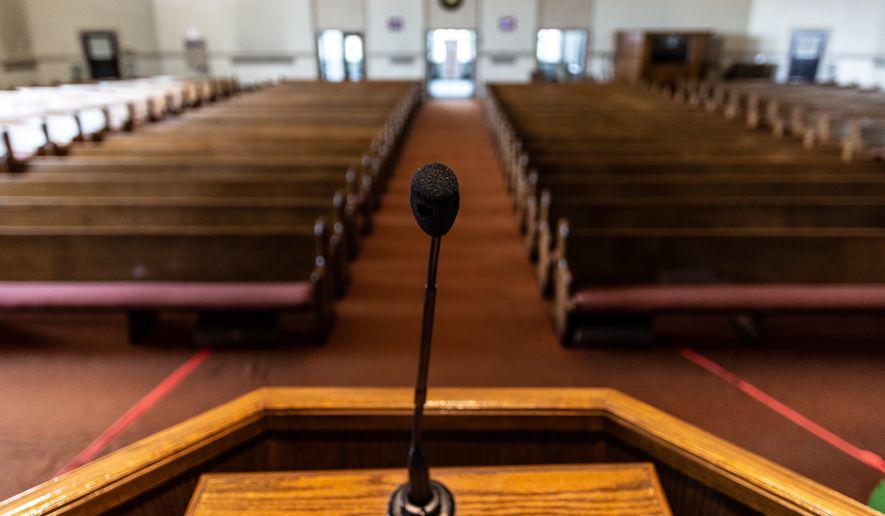OPINION:
Suicide and overdose deaths abound. Unhappiness has become endemic. Confusion is our newfound cornerstone. All the while, the most relevant solution to the afflictions of the soul — authentic, personal faith — is dismissed, diminished and laughed off.
It’s no secret that the predominant modern perspective is self-fulfillment fueled by a temporal-obsessed worldview elevating the self above all else. And yet, we languish individually and corporately as we desperately look around and cling to whatever we think might fulfill us.
As noted in my last column, many secular activists and their devotees mock prayer, dismiss church and hold open disdain for Christian values. You’d think there was some sort of ethical slam dunk — some form of situational proof — propping up their anti-faith ideals.
Yet, even a cursory look at the situation before us drops the sledgehammer on secularists’ whims, showcasing not only the factual inaccuracies at the core of their antics but also the dangerous fallout that is plaguing our society.
First, let’s start with the dire reality that American culture has been on a downward spiral for some time now, with discontentedness abounding.
In 2019 alone, 12 million Americans seriously contemplated suicide, 1.4 million attempted suicide, and 47,500 carried it out, according to the Centers For Disease Control and Prevention. The suicide rate was up 33% from 1999 to 2019, and fentanyl, a synthetic opioid, killed more young people than COVID-19 (70,630 in 2019 alone).
We’re smack in the middle of joint epidemics of hopelessness and depression. The statistical evidence of our desperate state could undoubtedly fill many newspaper pages, but one solution is quite simple: the encouragement of faith in our society.
People desperate for happiness and fulfillment shouldn’t be shocked to find that those who attend church most frequently are more likely to have a favorable view of life. I recently covered this issue and detailed veteran Gallup social scientist Frank Newport’s stunning comments on faith and happiness.
“The January Gallup data indicate that 92% of those who attend church services weekly are satisfied, compared with 82% of those who attend less than monthly,” Mr. Newport wrote. “The difference is even more evident in terms of the percentage who report being very satisfied — 67% of those who attend weekly are very satisfied with their personal life, compared with 48% among those who are infrequent attenders.”
Mr. Newport noted a long line of studies showing a correlation between faithfulness and happiness. In the end, none of this is rocket science: Having faith in God is fulfilling and in line with what mankind was created to do. Faith sustains, gives hope and solidifies healthy accountability; it reminds us that we matter and were created with purpose.
Yet our culture has tragically become dominated by a self-centric ideology that obsessively prioritizes personal feelings over eternal truth.
Apathy and hostility in some circles toward biblical truth — the antidote to much of our discontentedness — is increasing at the same time suicide, fentanyl overdoses, confusion and a mass identity crisis are increasingly gripping Americans.
Generation Z, composed of people born between 1999 and 2015, is the first “post-Christian” generation, according to the Barna Group. In 2018, the situation hit a fever pitch when the research firm reported that “the percentage of Gen Z that identifies as atheist is double that of the U.S. adult population.”
We’re somehow expected to act surprised when we hear that Gen Z is also most likely to experience mental health woes, yet why would we be so shocked? The data proving our need for the divine is boundless, and yet so many act as though they have uncovered a better way.
Sadly, they have nothing to show for their weak argumentation but an increasingly broken and downtrodden populace.
While secular activists and atheists tell us the answer to our woes is inside ourselves, the data corroborate not only our need for God but also the insufficiency for us to find sustaining truth within the confines of our hearts and minds.
Faith matters — and the quicker we embrace that reality, the healthier our culture will become.
• Billy Hallowell is a journalist, commentator and digital TV host who has covered thousands of faith and culture stories. He is the director of content and communications at Pure Flix and previously served as the senior editor at Faithwire and the former faith and culture editor at TheBlaze.




Please read our comment policy before commenting.